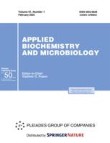
Abstract
Mutant variants of mini-intein PRP8 from Penicillium chrysogenum (Int4b) with improved control of C-terminal processing are characterized. The studied variants can serve as the basis for the self-removal of polypeptide tags that can carry an affine label and optimize the process of the obtainment of target proteins and peptides in E. coli cells. They make it possible to synthesize target molecules composed of soluble and insoluble hybrid proteins (fusions), to conduct their affine purification and autocatalytic processing, and to obtain mature target products. The presented variants have a number of features as compared to the known prototypes. In particular, the mutant mini-intein Int4bPRO, which contains the L93P mutation, has temperature-dependent properties. It is able to produce target molecules composed of soluble fusions at a cultivation temperature below 30°C; however, it directs most synthesized fusions into insoluble intracellular aggregates after an increase in temperature to 37°C. The transition of Int4bPRO to an insoluble form is accompanied by the complete inactivation of C-terminal processing. Further application of the standard protein denaturation–renaturation procedures enables efficient reactivation of Int4bPRO and the processing of its fusions in vitro. Two other variants, Int4b56 and Int4b36, which contain the point mutation T62N or a combination of D144N and L146T mutations, respectively, have a reduced rate of C-terminal processing. Their use in E. coli cells allows optimization of the biosynthesis of biologically active target proteins and peptides composed of soluble fusions that are suitable for affine purification and subsequent intein-dependent processing without the use of protein denaturation–renaturation procedures.



Δεν υπάρχουν σχόλια:
Δημοσίευση σχολίου
Σημείωση: Μόνο ένα μέλος αυτού του ιστολογίου μπορεί να αναρτήσει σχόλιο.